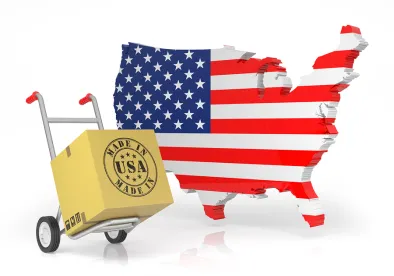The FTC has said it numerous times: If your products – including their components – are not actually “all or virtually all” made in America, marketers should not label them as “Made in USA (MUSA).” The FTC’s latest enforcement action for false MUSA advertising against North Carolina-based motocross and ATV parts company, Cycra, is a reminder of just how seriously the FTC takes failures to comply with its 2021 Made in USA Labeling Rule (MUSA Rule). It’s also a reminder that words matter.
The FTC’s complaint, announced on April 18, 2023, states that since 2019 to at least May 31, 2022, Cycra claimed in its online marketing and on its packaging that its products are made in the U.S. The company’s website and social media accounts featured ads stating: “Proudly designed, developed and manufactured in Lexington, North Carolina,” “Proudly made in the USA,” and “Made in the USA.” On its packaging, Cycra labeled more than 150 products with the words “Made in the USA” alongside an image of the U.S. flag. In reality, however, according to the FTC, Cycra routinely used components imported from Asia and Europe, and on at least two occasions, U.S. Customs and Border Patrol (CBP) officers flagged Cycra shipments of finished products imported from Taiwan bearing MUSA labels. The complaint also alleges that the CEO controlled or had authority to control, or participated in, the alleged violative practices, had direct knowledge of the company’s overseas business dealings, and was the primary point of contact with CBP agents.
The MUSA Rule prohibits marketers from labeling products as “Made in USA” unless:
(1) “the final assembly or processing of the product occurs in the United States”;
(2) “all significant processing that goes into the product occurs in the United States”; and
(3) “all or virtually all ingredients or components of the product are made and sourced in the United States.”
A violation of the MUSA Labeling Rule is considered by the FTC to be an unfair or deceptive act or practice in violation of Section 5(a) of the FTC Act.
Under the FTC’s proposed consent order, Cycra and its CEO, Steven James, were fined $872,577. A total of $221,385 is due within 8 days, after which the rest of this penalty is suspended based on financial statements furnished by the company and James; it will be reinstated if either misrepresent the company’s or James’ personal financial condition. Both respondents are barred from representing their products are “Made in the USA,” whether expressly or impliedly, unless:
-
The final assembly or processing of the product occurs in the U.S., all significant processing that goes into the product occurs in the U.S., and all or virtually all ingredients or components of the product are made and sourced in the U.S.; or
-
A clear and conspicuous qualification appears immediately adjacent to the representation that accurately conveys the extent to which the product contains foreign parts, ingredients, or components, and/or processing; or,
-
For a claim that a product is assembled in the U.S., the product is last substantially transformed in the U.S., the product’s principal assembly takes place in the U.S., and U.S. assembly operations are substantial.
Other injunctive provisions include a requirement to identify purchasers so the agency can administer redress, mandatory direct notices to purchasers, plus mandatory reporting on the notification program under penalty of perjury, and a mandatory cooperation clause. The proposed order also includes other customary terms, such as a prohibition on any misleading representation regarding the country of origin, record-keeping obligations, and compliance monitoring annually for 20 years. Both the company and James must submit reports detailing all business activities and how they are complying with the terms of the order.
Promises of “Made in the USA” can be enticing to consumers looking to support businesses that offer homegrown products. But companies promoting their products or services as American-made need to remember that FTC expects them to abide by the MUSA Rule, and that failure to do so can be costly to both companies and executives.




 />i
/>i

